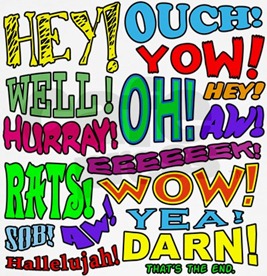

Compare this to saying, "That spoon is huge." The latter sentence is lifeless and conveys no emotion to the reader whatsoever. You can imagine the character saying this with widened eyes and an excited tone while commenting on the massive spoon at which he is looking. As you can see, it is followed by an exclamation mark, adding excitement to the quote. "Wow," being the interjection, stands completely on its own, not connected to the subsequent sentence by anything other than context. This sentence illustrates the function of an interjection. Interjections are often followed by an exclamation mark, leading people to refer to them as "exclamations." Examples of interjections are "Ouch!" and "Wow!" or even "Cheers!" "Wow! That spoon is huge!" Interjections are used by authors to add an element of realism to their prose, as humans often use interjections heavily within their everyday speech. By "stands alone," we mean to say that an interjection is not grammatically connected to the sentence in which it is used. After editing thousands of books, the editors at believe that the most useful tool for creating an air of humanism in a character's dialogue is the interjection.Īn interjection is a noun that stands alone in a sentence and is designed to convey the emotion of the speaker or narrator. Whether an author is writing fiction or nonfiction, they are almost always tasked with creating some form of dialogue. Dialogue may come off as rigid and artificial. Interjections are meaningful words that express a particular sentence.Creating realistic, natural-sounding dialogue in writing can be a difficult task for writers. For example, the interjection "ouch" can be used to express pain, but it can also be used as a command ("Ouch, stop doing that!"). Interjections are not always easy to categorize, and there are many that can fall into more than one category. The interjection expresses feelings such as sorrow, happiness, or excitement. The interjection is used to express confusion or to ask for clarification.

The interjection is used to give a warning or demand attention. Oh, the interjection is used to express surprise, disbelief, or joy. Interjections are commonly used in spoken English and can be categorized as follows: An interjection is a word or phrase that expresses strong emotion or is used to emphasize a statement.


 0 kommentar(er)
0 kommentar(er)
